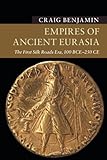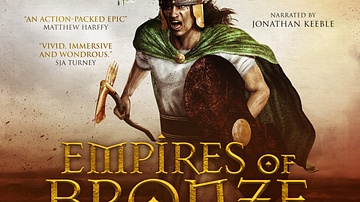Search
Did you mean: Empire?
Search Results

Book Review
Empires of Bronze: Son of Ishtar
Empires of Bronze: Son of Ishtar is Gordon Doherty's richly detailed fictionalization of events and people who lived during the height of the Hittite Empire. Set in the 1300s BCE, the story follows King Mursili's third son, Hattusili III...

Book Review
Empires of Ancient Eurasia: The First Silk Roads Era, 100 BCE – 250 CE
In the book's Introduction, Craig Benjamin writes that, between the 2nd century BCE and the mid-3rd century CE, the Silk Roads linked together many cultures and communities throughout Afro-Eurasia. This is the “First Silk Roads Era,” which...

Article
Agriculture in the Fertile Crescent & Mesopotamia
The ancient Near East, and the historical region of the Fertile Crescent in particular, is generally seen as the birthplace of agriculture. The first agricultural evidence comes from the Levant, from where it spread to Mesopotamia, enabling...

Article
The Salt Trade of Ancient West Africa
Salt from the Sahara desert was one of the major trade goods of ancient West Africa where very little naturally occurring deposits of the mineral could be found. Transported via camel caravans and by boat along such rivers as the Niger and...

Article
The Extent of the Roman Empire
Time has seen the rise and fall of a number of great empires - the Babylonian, the Assyrian, the Egyptian, and lastly, the Persian. Regardless of the size or skill of their army or the capabilities of their leaders, all of these empires fell...

Article
What Were the Consequences of WWII?
The consequences of the Second World War (1939-45) were many and varied. Nazi Germany, Fascist Italy, and military-dominated Japan were all defeated. Many occupied countries were liberated and regained their freedom while others were obliged...

Article
Interview with Barry Strauss: Jews vs. Rome - The Latest Book by Barry Strauss
For over two centuries, ancient Judea was a restless province of the Roman Empire, marked by rebellions, shifting loyalties, and the tensions between imperial might and local identity. In his latest book, Jews vs. Rome: Two Centuries of Rebellion...

Article
Enemies of Rome in the 3rd Century CE - The Greatest Enemy of Rome was Rome Itself
It has been said that the greatest enemy of Rome was Rome itself, and this is certainly true of the period known as the Crisis of the Third Century (also known as the Imperial Crisis, 235-284). During this time of almost 50 years, over 20...

Interview
Author Interview: Son of Ishtar by Gordon Doherty
Today we sit down with Gordon Doherty to discuss his new book Empires of Bronze: Son of Ishtar. Based in the dark and cold north (i.e. Scotland), Gordon has written extensively on ancient Greece and Rome. His new novel, however, takes us...

Definition
Mesopotamia
Mesopotamia (from the Greek, meaning 'between two rivers') was an ancient region located in the eastern Mediterranean bounded in the northeast by the Zagros Mountains and in the southeast by the Arabian Plateau, corresponding to modern-day...